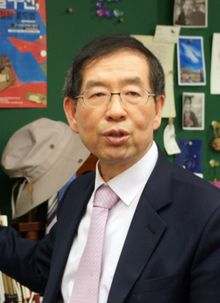Park Won-soon
| Park Won-soon | |
|---|---|
| 박원순 | |
 |
|
| Mayor of Seoul | |
|
Assumed office 27 October 2011 |
|
| Preceded by | Oh Se-hoon |
| Personal details | |
| Born |
26 March 1956 Changnyeong, South Korea |
| Nationality | South Korean |
| Political party | Democratic Party of Korea |
| Spouse(s) | Kang Nan-hee |
| Children | 2 |
| Alma mater |
Dankook University University of London |
| Korean name | |
| Hangul | |
|---|---|
| Hanja | |
| Revised Romanization | Bak Wonsun |
| McCune–Reischauer | Pak Wŏnsun |
Park Won-soon (born 26 March 1956) is a South Korean lawyer. He was elected as Mayor of Seoul, South Korea on October 26, 2011.
Elected as an independent candidate with the support of the Democratic Party and Democratic Labor Party, Park's victory is seen as a blow in particular to the Grand National Party and the prospective presidential candidacy of Park Geun-hye, who had publicly supported Park Won-soon's opponent Na Kyung-won, and a triumph for the independent Ahn Cheol-Soo, whose support he received. However, the inability of the Democratic Party to present its own candidate, and Park's refusal to join it after he had received its endorsement, has served to present Park as a candidate independent of the interests of both established parties.
Prior to his election, Park has had a thirty-year history as a social justice and human rights activist dating to his time at Seoul National University in the 1970s when he was expelled for protesting the policies of President Park Chung-hee and imprisoned for four months. In 1994, he was a principal founder of the nonprofit watchdog organization People's Solidarity for Participatory Democracy which monitors government regulatory practices and fights political corruption. In 2002, Park stepped down from PSPD to run The Beautiful Foundation, a philanthropic group that promotes volunteerism and community service and addresses issues of income inequality. Beginning in 2005, Park served as part of South Korea's Truth and Reconciliation Commission to address the history of human rights violations in Korean history from Japan's rule of Korea in 1910 up until the end of Authoritarian Rule in Korea with the election of President Kim Young-sam in 1993. In 2006, as an offshoot of The Beautiful Foundation, he founded the Hope Institute, a think tank designed to promote solutions arising from grass roots suggestions for social, educational, environmental, and political problems.
...
Wikipedia
